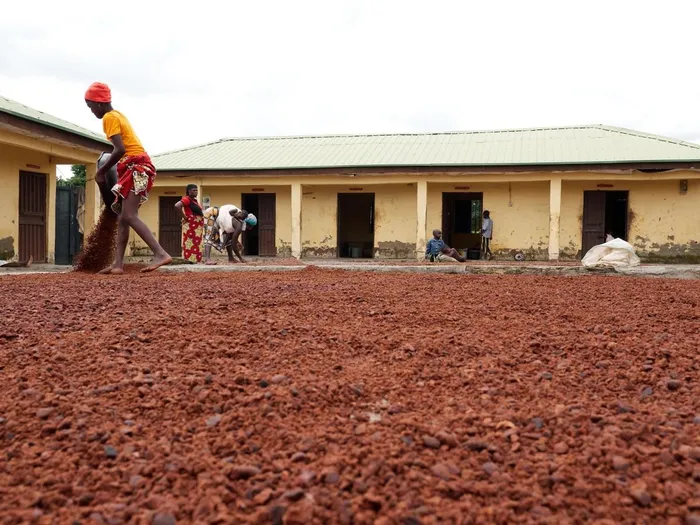Promising growth, Nigeria shea nut export ban pinches producers

Woman spread out roasted and grounded shea nuts on the floor so that they can dry out at the Talba Shea Butter Village in Kodo on September 9, 2019. At the end of August 2025, the Nigerian authorities announced a six-month ban on shea nut exports.
Image: AFP
While sorting through the brown nuts she had collected from the leafy shea trees near her home in Saki, southwestern Nigeria, Adija Rahman was scathing of the government's plans to transform her industry.
Africa's most populous country produces roughly 40 percent of the world's supply of shea nuts, used to make shea butter, a key ingredient in soaps, lotions and cosmetics.
But the west African nation is at the bottom of the supply chain, exporting nearly all its nuts and producing almost no butter - capturing only one percent of the global market share for the world's $6.5 billion worth of shea products.
The government announced a six-month ban last month on all shea nut exports, which the authorities say will spur local butter production.
But in the meantime the move, implemented without warning or consulting those in the industry, has thrown the livelihoods of people like Rahman into chaos.
"It feels like they want us to be crushed," Rahman, a 45-year-old mother of six, told AFP.
Where 25 kilograms (55 pounds) of nuts used to sell for 35 000 naira ($23), that haul would now go for 15 000 naira, she pointed out.
Moving up the so-called "value chain"- switching from producing raw materials to transforming them into finished products - is a key step in a country's economic development, economists say.
Despite Nigeria's oil wealth, millions of Nigerians live in poverty. Much of the country's agricultural output is dedicated to exporting raw materials, while manufacturing and even refining oil into petrol have fallen by the wayside after years of government mismanagement.
But critics argue the shea nut ban comes without a clear roadmap for increasing local production, and is disrupting contracts between nut producers and buyers signed at the beginning of the harvest.
"The farmers will not be able to sell enough since the local demand for the produce and product is very low," said Babatunde Olarewaju, an agronomist and agriculture expert.
"Exporters will not be able to meet up with their contracts that were already signed."
Meanwhile, the few processing companies that do exist are set to benefit massively - with Olawrewaju warning of a potential "monopoly" as they become the only buyers in town.
Boosting incomes
In banning shea nut exports, Nigeria joins a growing list of west African countries to have done so, including Burkina Faso, Mali, Ivory Coast, Togo and Ghana.
According to Vice President Kashim Shettima, the ban - which is subject to review at the end of the six months - aims to "generate around $300 million annually in the short term".
He said the policy was "designed to secure raw materials for our processing factories", help domestic factories run at full capacity and boost rural incomes and jobs.
Beyond the factories, shea butter has long been produced locally in Nigeria and other west African countries -- often by women in an artisanal manner, outside a regulatory regime that would certify it for export.
"There was no consultation," Mohammed Ahmed Kontagora, President of the National Shea Product Association of Nigeria, told AFP.
Still, he offered support for the initiative, saying that "in the long run, it's a good policy".
Increased local shea production could also lead to cheaper prices for Nigerian-made beauty products, said Ikemesit Effiong, a partner at Lagos-based consultancy SBM Intelligence.
Trucks turned back
In the meantime, however, raw nut prices are expected to continue to fall.
Trucks filled with nuts have been turned back due to cancelled orders, said Abd-Kabir Adedeji, a 32-year-old vendor in Saki, some 300 kilometres (185 miles) north of Lagos.
"They should have... informed us in advance," said Risikat Ismail, another shea nut seller.
"To take such a decision this way is nothing but wickedness, pure wickedness."
For Rahman and the thousands of Nigerians -- mostly women, though the exact number is unknown - who cultivate nuts, their work is in the informal economy, with no safety net.
She has fallen into debt, and is not sure how she'll make up for her profits -- typically 200 000-250 000 naira per year -- which went to school fees for her children.
"There is nothing we can do now," she told AFP.
AFP